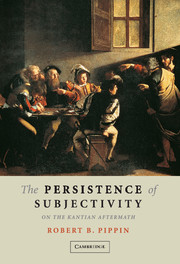Book contents
- Frontmatter
- Contents
- Acknowledgments
- The Persistence of Subjectivity
- 1 Introduction: “Bourgeois Philosophy” and the Problem of the Subject
- PART I SETTING
- PART II THEORISTS
- 3 Necessary Conditions for the Possibility of What Isn't: Heidegger on Failed Meaning
- 4 Gadamer's Hegel: Subjectivity and Reflection
- 5 Negative Ethics: Adorno on the Falseness of Bourgeois Life
- 6 The Unavailability of the Ordinary: Strauss on the Philosophical Fate of Modernity
- 7 Hannah Arendt and the Bourgeois Origins of Totalitarian Evil
- 8 On Not Being a Neo-Structuralist: Remarks on Manfred Frank and Romantic Subjectivity
- 9 Leaving Nature Behind, or Two Cheers for Subjectivism: On John McDowell
- Postscript: On McDowell's Response to “Leaving Nature Behind”
- PART III MODERN MORES
- PART IV EXPRESSION
- Bibliography
- Name Index
- Subject Index
Postscript: On McDowell's Response to “Leaving Nature Behind”
Published online by Cambridge University Press: 05 June 2012
- Frontmatter
- Contents
- Acknowledgments
- The Persistence of Subjectivity
- 1 Introduction: “Bourgeois Philosophy” and the Problem of the Subject
- PART I SETTING
- PART II THEORISTS
- 3 Necessary Conditions for the Possibility of What Isn't: Heidegger on Failed Meaning
- 4 Gadamer's Hegel: Subjectivity and Reflection
- 5 Negative Ethics: Adorno on the Falseness of Bourgeois Life
- 6 The Unavailability of the Ordinary: Strauss on the Philosophical Fate of Modernity
- 7 Hannah Arendt and the Bourgeois Origins of Totalitarian Evil
- 8 On Not Being a Neo-Structuralist: Remarks on Manfred Frank and Romantic Subjectivity
- 9 Leaving Nature Behind, or Two Cheers for Subjectivism: On John McDowell
- Postscript: On McDowell's Response to “Leaving Nature Behind”
- PART III MODERN MORES
- PART IV EXPRESSION
- Bibliography
- Name Index
- Subject Index
Summary
The preceding chapter first appeared in Reading McDowell: On Mind and World, edited by Nicholas H. Smith (2002). McDowell responded individually to each of the essays in the collection, and the Cambridge University Press referees for this manuscript all suggested that I make use of this occasion to write a response to that response. I respond at some length (quite a bit more than the three pages of McDowell's rejoinder) because the theme of this book – the persistence of the difficulty in understanding what it is to be the subject of thought and of action and the importance of the post-Kantian struggle to understand that issue – comes up in an important way in McDowell's recent work in general and in these rejoinders, and I hope to make use of this occasion to try to clarify some controversial issues.
I try first to summarize McDowell's counters. There are five points. First, since much of “Leaving Nature Behind” (LNB) argues that one of McDowell's worries, “subjectivism,” should, when properly understood, not be seen as a danger and that there is no good reason to drag “nature” into the discussion, McDowell first complains that I am inflating his use of such an appeal in order to complain about it. “Bald naturalists” are the worry.
Information
- Type
- Chapter
- Information
- The Persistence of SubjectivityOn the Kantian Aftermath, pp. 206 - 220Publisher: Cambridge University PressPrint publication year: 2005
Accessibility standard: Unknown
Why this information is here
This section outlines the accessibility features of this content - including support for screen readers, full keyboard navigation and high-contrast display options. This may not be relevant for you.Accessibility Information
- 5
- Cited by
